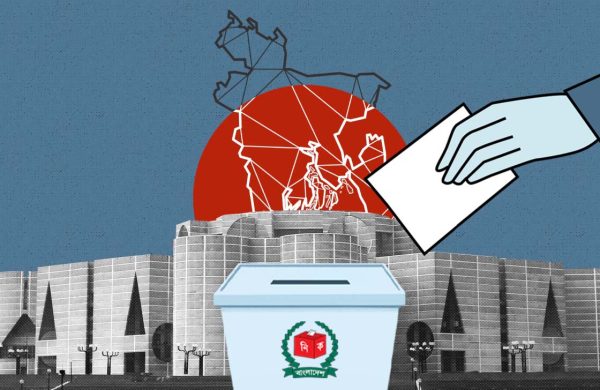Financial literacy matters more than ever
- Update Time : Thursday, August 29, 2024

–Amir Mohammed Khosru–
Economic landscapes are constantly shifting and financial markets are becoming wider than ever. More banks, financial institutions, mobile banking and digital banking mean more opportunities for the consumers. Money is getting easier to the consumers. Credit cards, micro loans, consumer loans and digit payment system are making life easier. But the borrowers or the card users need to be apt in consuming the facilities. Besides, navigating complex financial instruments like cryptocurrency, stocks, mutual funds, and avoiding scams can be challenging for the average persons. An individual may make loss if he has not knowledge about them. Above all to ensure long-term stability in life, manage and reduce debt, prevent overspending and promote savings, subject of financial literacy comes.
Financial literacy-the ability to understand and manage personal finances-has become an essential skill for navigating the intricacies of modern life. For instance, if we understand how to budget, we can allocate our income wisely, ensuring that we cover our essential expenses while still saving for future goals. Being financially literate equips us with the fundamental tools needed to build a smart and sustainable relationship with money.
We often see some individuals, even if well off, are entangled in debt due to not maintaining credit card in good ways. Without understanding how credit works, those individuals overspend on credit cards or take out high-interest loans, leading to unmanageable debt. We often see credit card user only pay the minimum amount due on a credit card, not realizing how much interest is accumulating, which results in a debt spiral.Likewise due to lack of financial literacy, people often don’t prioritize saving or understand the importance of an emergency fund. This leaves them vulnerable in case of unexpected expenses, such as a medical emergency or job loss, leading to financial instability. Without budgeting skills, individuals live beyond their means, spending all they earn and saving nothing. This leads to a stressful cycle where they are constantly struggling to make ends meet and are unable to build wealth over time.
To lead a secured life, financial literacy is important. This knowledge sets us on a lifelong path of improving our financial well-being. The earlier we start to develop financial literacy, the more secure our financial future will be. We can find the essence of the financial literacy in the concept where the Organization for Economic Co-operation and Development (OECD) defines financial literacy as “the combination of financial awareness, knowledge, skills, attitude, and behaviors necessary to make sound financial decisions and ultimately achieve individual financial well-being.”
“Financial literacy-the ability to understand and manage personal finances-has become an essential skill for navigating the intricacies of modern life. For instance, if we understand how to budget, we can allocate our income wisely, ensuring that we cover our essential expenses while still saving for future goals”
Nobel laureate Richard Thaler (born in September 12, 1945), an American economist who was awarded the 2017 Nobel Prize for Economics for his contributions to behavioral economics, emphasizes that financial literacy equips people to avoid common pitfalls that can derail their financial security, such as overspending, under-saving, and falling into high-interest debt traps. In his one of the most influential books “Nudge: Improving Decisions About Health, Wealth, and Happiness”, co-authored with Cass Sunstein, explores how people make decisions, including financial decisions, and how they can be guided to make better choices through “nudges. In “Nudge,” Thaler discusses how people make financial decisions and how small changes (nudges) in the way choices are presented can significantly improve financial outcomes, which is closely related to the concept of financial literacy.
The results of the National Representative Survey of Bangladesh reveal that the country has an overall financial literacy score of 45.64% out of 100. This score is derived from the combined assessment of three key components of financial literacy: Financial Behavior, Financial Attitude, and Financial Knowledge. According to the Financial Inclusion Insights (2018) Program by Intermedia Research, only 28% of the population in Bangladesh is financially literate. This widespread financial illiteracy often leads to significant challenges, such as the burden of loans. For instance, when the interest rate on loans was 9%, some individuals took out loans based on that rate. However, as the interest rate climbed to as high as 14% in some banks, the monthly installment payments increased, creating a heavier financial burden for borrowers. Additionally, the lack of financial knowledge leaves people vulnerable to digital scams and fraud, further exacerbating their financial difficulties. Without a solid foundation in financial literacy, individuals are at risk of making poor financial decisions that can have long-term consequences on their financial well-being.
According to a 2022 report by the National Financial Educators Council, a lack of financial knowledge cost Americans an average of $1,819 per person in 2021. This figure represents money lost through avoidable financial mistakes, such as paying high-interest rates on credit cards, incurring unnecessary bank fees, or making uninformed investment decisions.On a broader scale, financial illiteracy contributes to rising levels of personal debt. The Federal Reserve reported that, as of 2023, U.S. household debt had reached a staggering $17 trillion, driven by increases in credit card balances, student loans, and auto loans. While not all debt is bad-some, like student loans, can be considered an investment in one’s future-mismanaging debt can lead to financial instability and stress.
Global financial crisis in 2008, which was partly driven by widespread ignorance about subprime mortgages and the associated risks. Many borrowers, lured by seemingly affordable loan terms, did not fully understand the long-term consequences of adjustable-rate mortgages. When interest rates spiked, millions found themselves unable to keep up with their mortgage payments, triggering a wave of foreclosures and contributing to a severe economic downturn. This crisis underscored the catastrophic effects of poor financial literacy, not just on individuals but on the global economy as a whole.
The 2008 crisis also revealed how financial institutions and borrowers alike were ill-equipped to manage the complexities of modern financial products. The lack of understanding led to reckless lending practices and risky investments, exacerbating the crisis. It became evident that without a strong foundation in financial literacy, even seemingly sound economic decisions could have devastating outcomes. The aftermath of the crisis served as a stark reminder of the importance of educating individuals about the potential risks and rewards in financial decision-making, and the critical need for responsible financial behavior to safeguard against future economic catastrophes



















